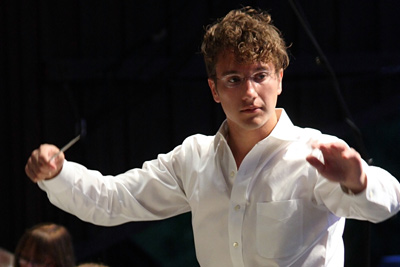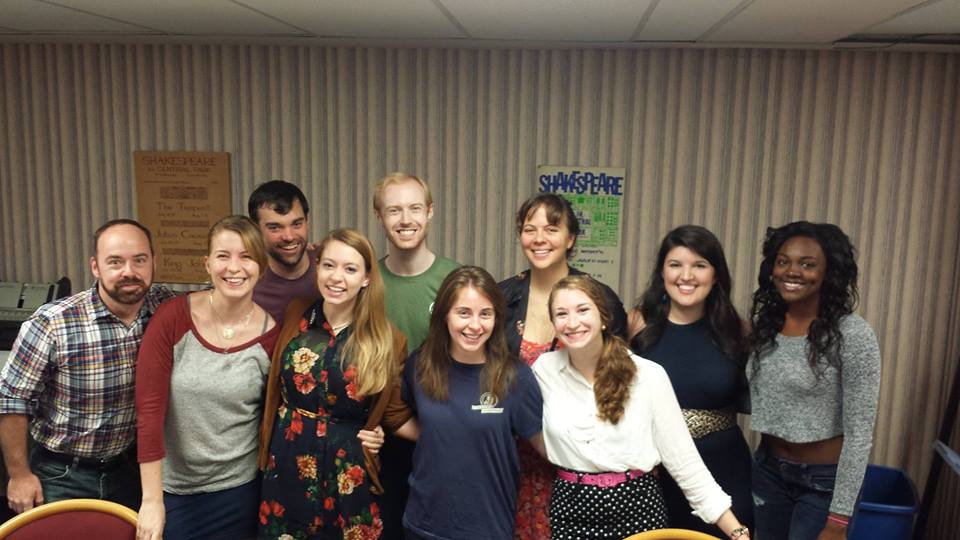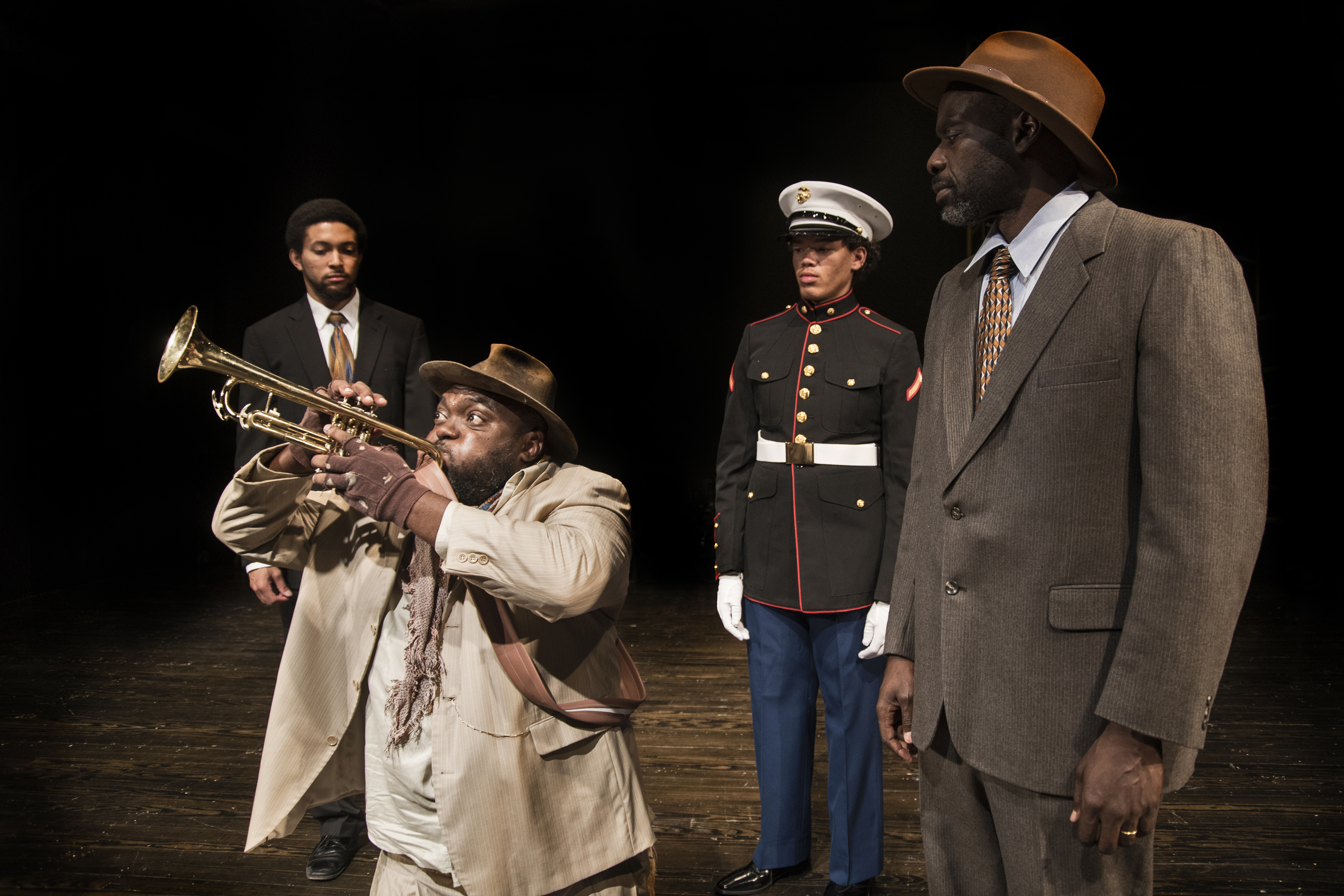Teddy Abrams. Photo by Josh Morell
Classical Classics
Part of the Music without Borders Program
Teddy Abrams, conducter
Review by Annette Skaggs
Entire contents copyright © 2016 Annette Skaggs. All rights reserved.
As part of the Music without Borders program the Louisville Orchestra headed to Jeffersontown Community Center. Upon entering the Center patrons were greeted with anxious artists displaying their wares and ready to talk about their talents. I enjoyed seeing a different scope of local artists than I’ve seen at other such functions. All talented in their respective mediums, it was nice to have a visual art production in tandem with an aural one. I applaud Rhonda Rowland, Arts Program Manager of Jeffersontown, for implementing the idea.
I have noticed in previous Orchestra concerts that there has been a Concertmaster rotation since Michael Davis’ retirement and tonight was no exception. With the Orchestra in their proper tone Maestro Abrams approached the platform wearing a jacket reminiscent of the Music period of tonight’s focus and addressed the capacity audience.
The Maestro admitted that the evening’s programming was a little different from his usual modus operandi, as he likes to include modern pieces, but this evening was focused on the Classical Period (1750-1827). Classical Period? Yes, despite the general moniker of Classical Music, there actually was a Classical period from where Mozart and Haydn emerged. But other notables came from this period and some of those are whom we heard this evening: Schubert, Salieri, Gluck, Boccherini, Beethoven, and the aforementioned Haydn and Mozart, who bookended the evening. Also, throughout the evening, we were going to hear the Louisville Orchestra play some pieces for the first time. I was a bit excited.
I could give you a Music Theory and History lesson about this period of time and what it meant to the music that we now listen to, but I will spare you. I will say that it is in this time that we see where composers start looking at ways to expand the composition of music, where they begin to experiment. Boccherini is a case in point and we will return to that shortly.
We began the evening with Mozart’s enchanting overture to Cosi Fan Tutte. Despite a small rhythmic stumble in the first few measures it was a great way to start the evening as an introduction to the period.
Next was one of the firsts for the LO, Schubert’s String Quartet No. 14 in D minor, “Death and the Maiden”. As the name states, it is a quartet but the LO used all of the 1st and 2nd Violins, Violas and Cellos, making for a richer and more vibrant sound. Playing the 1st movement, Allegro, the strings’ musical phrasing created a beautiful landscape.
In Haydn’s Symphony No. 102 in B-flat Major one gets a sense that the piece was written with royalty in mind. The brass in the Largo-Vivace was impressive but there was a point where I thought I heard too much vibration in the bass section. By the way, the Maestro didn’t care for Haydn when he was a young student, saying he was boring, but learned later in life how exciting he actually is.
In another first for the LO we listen to Salieri’s Overture to Tarare. And no, Salieri did not kill Mozart; they were contemporaries whose work often ran parallel with the other, sharing the same librettists and working with the same composers. Tarare was a big hit when first produced as it was a veiled commentary on political and social issues of the time. As for its sound, I can hear similarities to Gluck.
Speaking of Gluck, Danza Degli Spettri e Delle Furie (Dance of the Furies), another LO debut, was delightful. I admit I was not familiar with the piece so now I want to hear the whole of it.
As displayed in the interesting Sinfonia Op. 30 No. 6 Musica notturna delle strade di Madrid, Boccherini really liked experimentation. The whole of the piece is like a day in the life of the people of Madrid of the time. Having been influenced by the music and culture of Madrid, Boccherini incorporated the sounds of guitar through the cello. I dare say that if you had closed your eyes you would have been challenged to tell the instruments apart. To say that this orchestration is different is an understatement. I will say that I wasn’t sure, in some moments, whether so much time was supposed to elapse before 2nd violin, viola and cello were supposed to pluck at their cue. In thinking about it, yeah, there was a glitch or two, but all involved giggled and smiled at it.
An undisputed King of the Classical period, Beethoven, gave us some of the most memorable music of all time, but this evening we got to listen to early Beethoven, where he was developing his style and sound. In German Dances #10, #7, and #5, we were greeted with a common use of prominent melody woven throughout, and in the final dance a liberal dose of tympani. Great job percussionists.
Lastly, we heard Mozart at perhaps his best, Symphony No. 41 in C Major, “Jupiter”. Incorporating everything that was learned in the past, what was being played in the present, and developing techniques and sounds that we would hear in the future, this piece was cumulative of the musical genius that was Mozart. It was the perfect piece to encapsulate the importance of the Classical Era of Music.
Thank you to Jeffersontown and to the Louisville Orchestra for a great reminder that we are surrounded by music and art at every turn.
Bravo Tutti
Classical Classics
February 5, 2016
Louisville Orchestra
Jeffersontown Community Center
10617 Taylorsville Road
Jeffersontown, KY 40299
Louisvilleorchestra.org
Annette Skaggs is heavily involved as an Arts Advocate here in Louisville, and is a freelance professional opera singer who has performed throughout Europe, St. Louis, Cincinnati, Boulder, Little Rock, Peoria, Chicago, New York and of course Louisville. Aside from her singing career she has been a production assistant for Kentucky Opera, New York Opera and Northwestern University. She has a 25+ year knowledge of the Classical Arts.



![Theatre [502] Finishes their Sophomore Season with a Fascinating Production of “The Aliens”](https://arts-louisville.com/wp-content/themes/Extra/images/post-format-thumb-text.svg)
